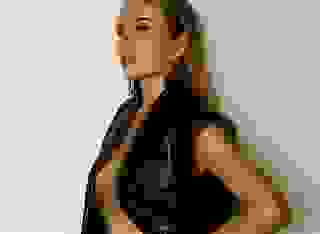- Loving Wives
- Al Andalus
- Page 5
Note: You can change font size, font face, and turn on dark mode by clicking the "A" icon tab in the Story Info Box.
You can temporarily switch back to a Classic Literotica® experience during our ongoing public Beta testing. Please consider leaving feedback on issues you experience or suggest improvements.
Click hereThen her face paled and she went back to the computer. "Omigod, look at this," she gasped. "The date the emir surrendered was January second. Thomas, the attack was never planned for New Year's Eve, it's coming the day after. ISIS wants revenge for that disgrace. I'll bet they're planning to launch their campaign to retake Al Andalus on the same date!"
The Raytheon guys were looking at her as though she was speaking Hebrew, but it sounded entirely plausible to me. Esther immediately got on the phone to call Tel Aviv, and I got our liaison to take me back up to the Director's office. After I had explained what we'd discovered, he nodded his head thoughtfully. "From what I know of these people, I think you're right. They never forget old grudges and they would love nothing better than to pull off a coup on the anniversary of that defeat."
He started to pick up his phone but stopped to look at me. "Now you and your team have to figure out a way to stop them."
When I got back to our war room, the Raytheon engineers were huddled around one of the terminals. They had managed to establish a secure link between Fort Meade and Andover, and they were now on line with a test version of the Patriot fire-control guidance system. The next few hours were spent trying to find a way to root out the virus. But the system designers had never contemplated having to do surgery on the Patriot's operating system, and they had no way to isolate the affected areas. "It's like an epidemic," one of the techs moaned. "It's spread throughout the system and it's out of control."
January 1
While we worked feverishly, New Year's Day in Israel proceeded without incident. Although Esther and I were gratified that her prediction had been right, it just meant we were that much closer to the time we thought the real attack would begin.
Finally, the head of Raytheon's technical team came to me. "We've been over and over this thing. There are only two things we can do. The first is to shut down all the units that have been infected and wipe their entire software systems completely, including all peripherals. Then we'll load software we know is clean, boot them up and test them. But that's a time-consuming process, and even then we can't be sure that the new load won't get contaminated somewhere along the line."
I shook my head and turned to Esther in frustration. "We can try that, but I don't think we can get the job finished in time before midnight rolls around again in Israel. Besides, we don't want to take the entire Dimona defense system offline that long. What if the attack comes early?"
She looked defeated, and I felt like I had failed. I turned back to the Raytheon people. "Isn't there anything else we can try, some sort of error-checking routine that would recognize the problem and stop the virus?"
The poor guy shook his head apologetically. "When the system was developed, the possibility of a virus was never considered. Now this damn disease has infected the entire system and we just don't have any antibiotic to kill it or vaccine to block it."
I started to speak but the words stuck in my throat as an idea from the past came to mind. "Smallpox!" I cried. When he looked at me in confusion, I went on. "The way you fight smallpox is with cowpox, a weaker form of the same disease. We may not be able to kill the virus," I said with growing excitement, "but what if we inoculate the system with another virus?"
The group looked at me skeptically. "Listen," I said, "we have a virus that has infects the Patriot system and causes it to produce faulty target data, data that's off by exactly +1.492 degrees. What if we write a second virus exactly like Al Andalus except that our version would direct the Patriot to adjust its targeting by -1.492 degrees? Wouldn't the two of them cancel each other out?"
The software engineers began to argue among themselves, heatedly debating the idea. After twenty minutes the head of the team turned back to me. "Some of our guys think it might work, but the rest of us are doubtful. How do we know the two viruses won't cause a bigger problem? How do we know they can co-exist at the same time? We don't even know that we can successfully "infect" the Patriot system a second time. We won't have time to test it properly."
"Listen, guys," I said, "we already know the original virus is both highly contagious and likely to be very effective. If we create a virus that's identical to the first one except with reciprocal values inserted, it's got to work. Besides, what other option do we have?"
There was a lot more discussion, but finally the group grudgingly conceded that creating an Al Andalus "antivirus" was the best chance we had. They set about creating the antivirus, carefully checking and rechecking to make sure that everything except the target values was absolutely identical.
While they were working, Esther grabbed my arm and looked at me with worried eyes. "Are you sure this will work, Thomas? If you're wrong . . ."
I looked at her and suddenly I felt the same emotions I'd had back in high school when those bullies were attacking Ginny. This was what I believed in and I wasn't going to back down. "This is the right thing to do," I said fiercely. "I'm sure of it."
She looked in my eyes for a moment and then said, "I believe you."
The next few hours were a blur. Some members of the team checked and double-checked the new antivirus while others made arrangements to transmit the code to technicians on the ground in Israel. Those people, in turn, got set up to "re-infect" the Patriot systems and then test them to ensure the antivirus had "taken."
Meanwhile, as the clock moved closer to midnight in Tel Aviv, Esther and I spent the time in seemingly endless meetings with dozens of people, all of whom were highly skeptical of our plan. Finally we wound up back in the Director's office, where, after a long and sometimes heated debate, he looked at his counterparts in other branches of the government and said, "Unless someone else is prepared to implement another solution in the next hour, let's stop talking and start taking action."
It was obvious that the others weren't satisfied, but they really had no other options. After the meeting broke up, the Director came over to Esther and me and said in a quiet voice, "I hope you know what you're doing, for all our sakes."
There wasn't anything I could say, so I simply nodded and the Director seemed to accept that. He motioned to us. "Alright, then, you two have ridden this horse this far, you deserve to see it through to the end. Come with me."
With that he led us to the roof of the building, where a helicopter was waiting with its engines idling. We climbed on board and the bird immediately took off. I'd never ridden in a helicopter before and found it pretty unnerving, but Esther wasn't fazed a bit. That reminded me again how little I knew about her.
After a few minutes I looked out the window and spotted the unmistakable shape of our destination: the Pentagon. This was certainly a week full of firsts for me: I'd never been to the Pentagon before either. Soon enough we landed on one of the helipads and were immediately escorted deep into the inner rings of the command center of U.S. military might. An armed guard was waiting beside a non-descript door, and when we approached he opened it and motioned us inside.
The room we entered was a long rectangle. Most of the center was taken up by a large oval table. The seats were arranged to face a huge flat-screen monitor that filled the wall at the far end of the room. Seated at the table were more generals, admirals and other high-ranking officials than I had ever seen in my life.
Esther and I were shown to one of the chairs that lined the side walls. Across the room I spotted the director who'd ordered me to Oak Ridge. He quickly looked away when he saw me staring at him. After a few minutes the lights were dimmed and everyone turned to face the giant flat-screen. At first the only light came from two time displays on the bottom of the screen. One showed Washington, D.C., the other Tel Aviv. Esther whispered anxiously, "It's almost midnight in Israel!"
Suddenly the big screen filled with a gods-eye view of the earth, but I couldn't figure out what I was seeing. Then the screen blinked and suddenly the same view reappeared, this time with a "normal" north-south orientation. I could see a line of lights that seemed to outline the shores of an ocean, and there were clusters of lights from other cities as well. Then lines appeared on the screen marking national borders, and circles and names popped up around the major cities. I realized that I was looking down from a satellite at a night-time view of the whole Middle East.
Suddenly the screen zoomed in, then zoomed in further. Now all I could see was what appeared to be the lights of a small town in the desert with a highway running by it. The caption read Dimona. "Too close," a voice spoke up, and then it looked as though we were climbing through the atmosphere. Now I could see the coast of the Mediterranean in the northwest corner of the screen and a dark area toward the east. "That's the Dead Sea," Esther whispered to me, pointing at the picture.
"A little further, please," the voice said, and suddenly we could see the whole of Israel and parts of its neighbors. "Alright, people, we're approaching zero hour," the disembodied voice said, and suddenly Esther was gripping my hand very tightly. The screen might look like some sort of media presentation, but her anxiety reminded me that there were real people down there.
"Keep your eyes on the north and northeast," she whispered again. "That's where we think the attack will come from."
"Syria and Iraq?" I asked.
She only nodded.
The time display ticked off the seconds, and I noticed there wasn't a sound in the room. Finally, when the clock displayed 24:00, I heard a collective intake of breath. But nothing happened that we could see. The seconds ticked by and I could hear whispered comments. "I told you so . . ." I heard someone say, and then Esther's nails bit into my hand. "There!" she said, pointing at a tiny orange-red arrow rising from the desert north of Israel. Then another and another blossomed. At first each one appeared almost to stand still, but then they began to arc over and fly south. More arrows lifted off from the northeast.
"Holy shit," someone exclaimed, "those bastards really did it. There must be over two dozen of them."
"Probably Scud-D's," another voice speculated.
Now the flaming arrows were past Jerusalem and coursing over the Dead Sea. Someone had put a marker with a timer on Dimona, and it was evident even to my untrained eye that it was the target. This was like watching a disaster in slow motion: I didn't want to watch yet I was mesmerized, unable to turn away.
Suddenly, new flashes appeared all around Dimona, and then there were new arrows of light rising into the air. Time seemed to a crawl and the oncoming arrows never wavered until I was sure that our antivirus had failed and the Patriots had missed. Then a large yellow blossom appeared in the night sky almost directly over Dimona, and almost immediately the darkness was filled with fiery flowers that glowed and then seemed to flutter away.
Then Esther flung her arms around me and was kissing me wildly. "You did it! You did it!" she cried. As I hugged her back I could hear cheering from the people in the room. Then a voice said, "Situation report from Dimona: one missile got through." Esther jerked around and we both stared at the screen. "Missile was apparently knocked off course and hit south of town; only minor damage is being reported." There were more cheers.
Suddenly I gasped for air and I realized I'd been holding my breath throughout the entire attack. But before I could say anything, the display showed a new series of launches, only these originated from within the State of Israel.
"What's happening?" I asked in confusion, but when I looked over, Esther was staring intently. "Patriots are not the only missiles we have," she said, never looking away from the screen. "Those are Delilahs, ground-launched cruise missiles carrying cluster munitions. Our radar will have tracked the path of every Scud and calculated the reciprocal course. Now we return fire." She turned to me and her face had a wolfish look. "You didn't think we would allow them to attack without retribution, did you?"
Even as I watched, the telltale lights were heading north and east. But this time, I realized, there were no Patriots to defend against the oncoming death. I did look away then.
I sat quietly in my chair and watched the congratulatory hugs and handshakes around the room. Soon afterwards, Esther was called away to take a phone call, and then I really felt like the odd man out. After a while, an MP came looking for me. "Sir, the NSA Director is going to be here for awhile. He's instructed me to offer you the services of the helicopter to take you and Ms. Freeman wherever you need to go."
Esther returned just then, and the two of us followed our escort through the corridors and out to the helipad. I thought she'd be dancing with happiness, but she seemed somewhat subdued. When we climbed up into the helicopter, she leaned over to the pilot and asked, "Would it be possible for you to take me to Dulles International Airport?"
"What's going on?" I asked in surprise.
"You know we say 'an eye for an eye and a tooth for a tooth,'" she said with a grim look. "The missile counterstrike you saw back there was the 'eye for an eye.' Now I've been called back to be part of 'a tooth for a tooth.' I'm catching the first plane to Tel Aviv tonight."
"Oh," I said glumly. "I thought maybe. . ."
She smiled and squeezed my hand. "I would have liked to celebrate as well, but we don't always get to decide such things."
The helicopter covered the twenty-five miles to Dulles in very little time at all, and then Esther was leaving. She turned to me and took my hands in hers. "You have surprised me in many ways, Thomas Selfridge. I will never forget you." Then she kissed me quickly and was gone before I could think of anything to say.
I was in a strange mood on my way back to College Park. Now that everything was over, the events of the last week seemed unreal, like scenes from a movie that flickered through my memory. The places I'd been, the people I'd met, the things that I'd done - none of it felt quite real. Part of the problem, I knew, was the way my emotions had gone back and forth through the spectrum. It was like I'd been dreaming under anesthesia and was having a hard time shaking off the effects.
But when I got home, I had to enter through the side door because there was a sheet of plywood nailed over my shattered front door. And the living room was just as disheveled as when I'd been there last. "I guess it wasn't a dream," I told myself wryly.
I managed to find something to eat in the refrigerator and then returned to the living room, where I righted an overturned chair and flopped down. Maybe it was just the adrenaline wearing off, but I began to feel depressed. I glanced at the clock and realized that it was almost midnight. Damn, the Christmas break was over and I had to be at work tomorrow.
I wandered back to the bedroom and turned on the light. Everywhere around me were signs of Ginny: photographs, her clothes, furniture that she'd picked out. I looked at the bed and couldn't help but wonder if she and Ameer had ever . . .
It was too much. I grabbed a blanket and went back to the living room to try to sleep on the couch.
January 2
The couch wasn't very comfortable to sleep on and I woke up early. But I really didn't mind because I was eager to see what the Washington Post had to say about the ISIS attack. I didn't expect see name would make the coverage, but I couldn't help but wonder if there would be any mention of the team that had developed the "antivirus."
But there was nothing on the front page, and when I took the paper inside and went through it carefully I found nothing anywhere. "How do you keep something like that secret?" I wondered.
I went on into work at the usual time and everything seemed normal. My co-workers showed no sign of awareness of anything unusual. "How was your holiday?" they asked, and I realized they had no way of knowing what had transpired. It was a little deflating.
Then about an hour later I got a summons to see Ben's boss. I was smiling when I entered, expecting congratulations and maybe more, but instead I got a scowl. He held up a document with my signature on it. "When you joined the NSA, you signed an oath to protect any information you gathered while you work here. Under Section 18 of the U.S. Legal Code, disclosure of any information about codes or ciphers of the U.S. or any foreign government, or any information relating to the acquisition or use of any device, apparatus or appliance involving such code is subject to a fine and/or imprisonment for up to ten years. That particularly applies to the session you witnessed yesterday and all events leading up it. Are we clear on that, Selfridge?"
When I nodded dumbly, he said, "Good, then you need to get back to work."
"What a come-down!" I thought as I headed back to my floor, "I didn't want a medal, but a little gratitude would have been nice."
By now it was clear that somebody had clamped a lid on the whole affair. Not only wouldn't there be any ticker-tape parades in my future, but I was beginning to feel as though I had been in the wrong place at the wrong time. The depression I'd been feeling last night returned, and it was compounded by the fact that I had another unpleasant duty to perform. I went on the Internet and began searching for a divorce attorney.
Things only got worse over the next few weeks. I saw a reference to the FBI, and that reminded me about Agent Henry. I did a Google search on him and found a small news item buried in the Knoxville News Sentinel. It reported that a federal employee named John Henry had died in a traffic accident in Frozen Head State Park. He was 37 years old; there were no other details. That made me sad. Henry was a decent guy who had died trying to protect me. I thought he deserved a lot better than a truncated obituary. I tried to get a little more information from FBI headquarters, but I hit a blank wall.
A few days later, a guy who sits next to me popped his head around the corner. "Hey, did you hear the news? Our boss's boss is getting a nice promotion. Apparently he pulled off some sort of coup back over the holidays and now he's getting his reward."
I didn't say anything, but inwardly I was seething. As far as I knew, the only thing he'd done to stop ISIS was to use me as bait. And now he was being rewarded?
I thought about trying to go to the Director of the NSA about what was going on. But before I could explore that avenue, some kind of brouhaha about Israel came up on Capitol Hill. The IDF had made some sort of incursion into Syria, and many in Congress were up in arms about Israeli aggression. When it came out that the NSA had made certain intercepted communications available to the IDF, there were howls of protest, and the next thing I knew the Director had resigned and the NSA had a new leader. There was even talk about delaying Israel's purchase of additional Patriot missile batteries, but ultimately the deal went through.
And just to add insult to injury, my efforts to divorce Ginny were going nowhere. I'd planned to file using "irreconcilable differences," but my attorney informed me that Maryland wasn't a "no fault" state. "Adultery, desertion, conviction of certain crimes, insanity, cruelty, and vicious conduct - those are the grounds for divorce in Maryland," he said.








